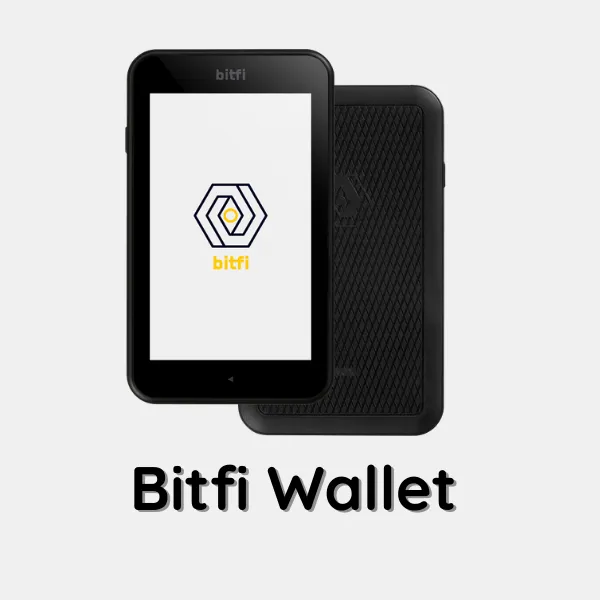Security is essential in the quickly changing world of cryptocurrency. As these digital assets continue to be widely used and accepted, the need for reliable and secure storage solutions grows more pressing. As a result, bitcoin wallets have become a crucial part of the ecosystem for digital assets. Bitfi, Trezor, and Ledger are some of the top options in this area. With an emphasis on security measures, user-friendliness, extra functionality, and the factors that might make Bitfi a better option for some users, this thorough review seeks to compare these three wallet systems.
Overview of Bitfi, Trezor, and Ledger
Bitfi is a unique hardware wallet that promises its consumers a high level of protection. Its frequently reported reputation as being “unhackable” stems from the distinctive technique it uses to manage private keys. Bitfi uses a technique to dynamically create private keys each time a transaction is carried out rather than storing them. This suggests that there are no keys available for a potential criminal to take even if the device is lost or stolen.
Trezor
Trezor has established the standard for safe bitcoin storage as a pioneering hardware wallet. Private keys are efficiently protected from online dangers by being kept offline in a safe environment inside the device. This process, referred to as “cold storage,” is a popular method for keeping cryptocurrency safe.
Ledger
Ledger is a hardware wallet similar to Trezor that employs cold storage to protect cryptocurrency. In order to offer an additional layer of protection, Ledger devices are renowned for embedding a secure chip, similar to the technology seen in credit cards and passports.
Security Comparative Analysis
Because of the way Bitfi handles private keys, it is considered “unhackable”. Every time a transaction is approved, Bitfi algorithmically produces the private keys rather than storing them. By eliminating the dangers of storing private keys, this technique makes it nearly difficult for them to be taken from the system.
Ledger and Trezor, on the other hand, keep private keys externally in a secure environment. This technique successfully protects the keys from online threats, but it assumes that the keys are kept somewhere physical. So, theoretically, they may be extracted by an attacker who physically gains access to the device and is extremely determined and well-equipped.
This differential may make Bitfi appear to be a more safe option for consumers who are concerned about losing or having their device physically stolen.
Effortless Use
All three wallets have made an effort to be as user-friendly as possible in terms of user experience. But Bitfi’s approach is distinctive in that it does not require the user to write down and store a recovery seed phrase, which can be a difficult and time-consuming task for non-technical users. Bitfi uses a user-defined PIN and a simple secret word (salt) instead. This procedure makes the wallet’s setup and use less complicated and intimidating.
On the other hand, users of Trezor and Ledger must write down and securely save a recovery seed phrase. If maintained properly, this more conventional approach can provide a high level of security. If the user loses the recovery seed, or if a third party views and copies it, it might also constitute a possible point of failure.
Extraordinary Qualities
Although Bitfi, Trezor, and Ledger all support a wide variety of cryptocurrencies, there are obvious variations in the extra capabilities they each offer.
With its Knox fee structure, Bitfi offers a distinctive feature. Knox allows customers to create a Bitfi wallet for a one-time cost and then conduct a limitless amount of transactions without paying any extra fees. For consumers who engage in frequent transactions, in particular, this can present significant financial benefits.
Trezor and Ledger, on the other hand, offer extra features like password managers and assistance with two-factor authentication (2FA). Beyond simply cryptocurrencies, these characteristics help to improve the security of a user’s digital life overall. They also work with a wider variety of software wallets and have slightly better developed ecosystems with third party integrations.
It’s important to keep in mind that both Trezor and Ledger charge usage fees. There is a network charge for each transaction that must be paid to the blockchain network’s miners, not to Trezor or Ledger. These fees, as opposed to Bitfi’s one-time cost, can add up over time, especially for users who conduct numerous transactions.
Why Bitfi Might Be Considered Better
Individual needs and tastes will ultimately determine which of Bitfi, Trezor, and Ledger to choose. But there are a number of reasons why Bitfi might be preferred:
Security: Bitfi’s novel strategy of algorithmically creating private keys for each transaction rather than storing them could provide higher security. If the gadget ends up in the wrong hands, there are no keys to be stolen.
Ease of Use: Bitfi makes the setup and usage procedure simpler by using a straightforward secret word and PIN rather than a recovery seed phrase. For people who are unfamiliar with cryptocurrency or who lack technical aptitude, this could be especially helpful.
Cost: For customers who conduct several transactions, Bitfi’s one-time charge structure, which permits unlimited transactions without extra fees, may be a substantial benefit.
In conclusion, Bitfi may appeal to a wide range of customers because to its distinctive security strategy, simple setup procedure, and affordable charge structure. But before selecting a wallet, it’s essential to thoroughly assess your unique needs, preferences, and risk tolerance, as with any choices linked to bitcoin storage.
Bitfi has a special mechanism for creating passwords that includes a “salt” and a secret phrase that the user defines. A random piece of data called the “salt” is added as an additional input to a hash algorithm to protect the password. The password for transactions is the secret phrase that the user defines. The private keys required for each transaction are generated algorithmically using the “salt” and the secret phrase together. The’salt’ and the secret phrase, it should be noted, are never saved on the device or sent over the internet, adding an added degree of protection.
Users wouldn’t lose access to their money should Bitfi stop operating. This is so that users may communicate safely with the blockchain, which is where the cryptocurrencies are stored, rather than the Bitfi wallet, which doesn’t really physically contain any bitcoins. Users can regenerate their private keys and so access their funds directly on the blockchain as long as they can recall their “salt” and secret phrase. In essence, Bitfi customers don’t need the company to be in business to access their cryptocurrency. This is a crucial feature of decentralized systems like cryptocurrencies, giving users access and control over their digital assets despite the standing of any one business or service provider.






